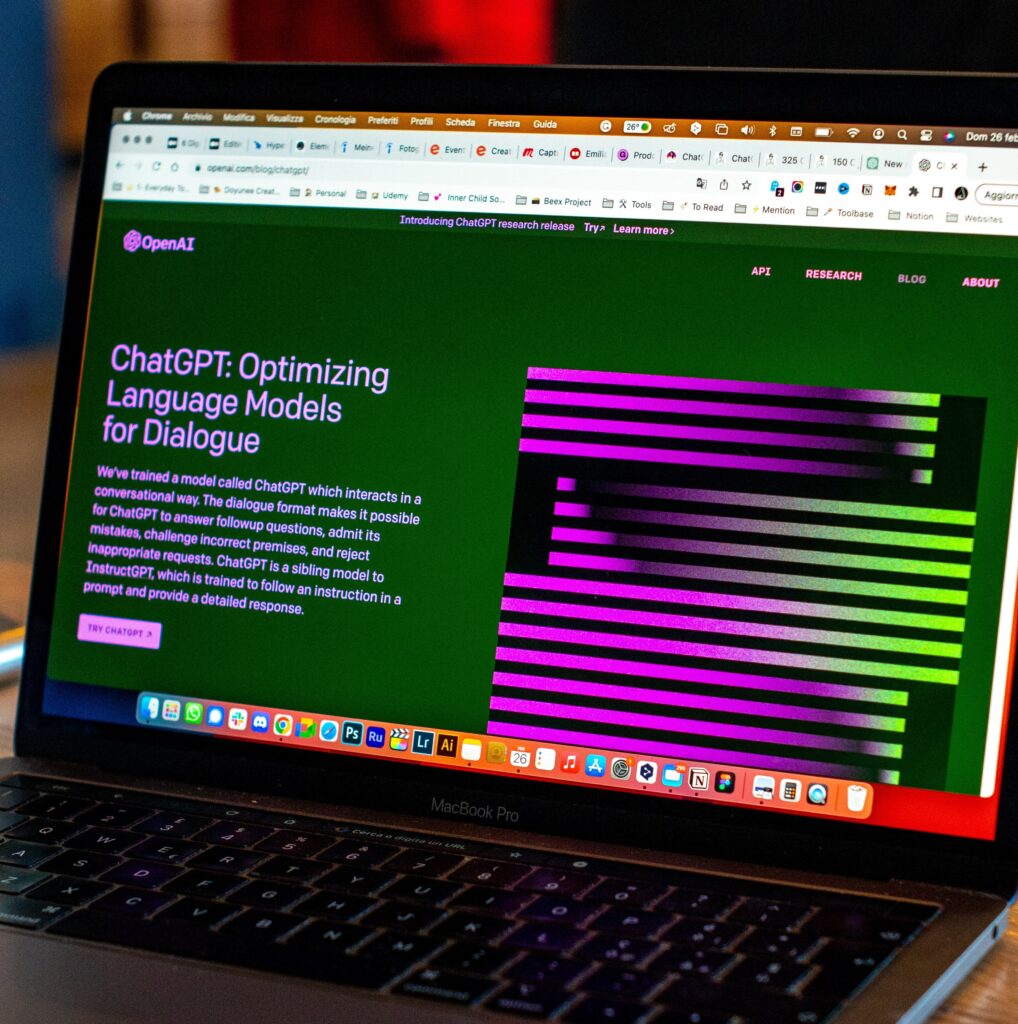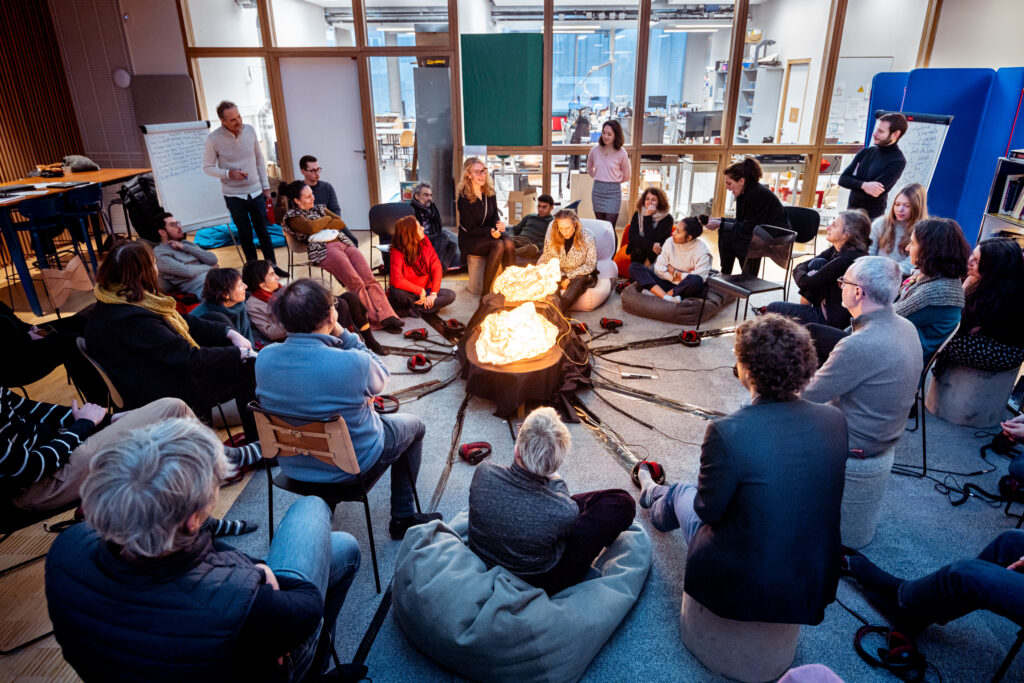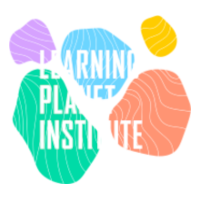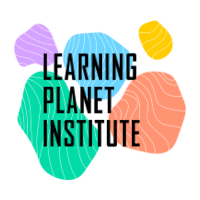At the Learning Planet Institute, our mission is to help individuals and organisations address the challenges of our time by mobilising the collective intelligence of humans and machines, so when in late 2022 OpenAI released ChatGPT, we immediately started testing it and discussing the consequences for our work. Wanting to hear perspectives from educators and critical thinkers, we hosted a panel on the impact of generative AI on education and learning at the LearningPlanet Festival with speakers Kate Arthur, Tina Götschi and Elie Rotenberg representing Primary & Secondary education, who were joined by Yann Le Cunff, representing higher education, and Alistair Croll, an expert in critical thinking. Our conversation explored many aspects and ideas, the essence of which we’ve captured below, with the assistance of ChatGPT, under the guidance of Chahab Nastar, who leads R&D at the Learning Planet Institute and who moderated the panel discussion.
Chahab: Is generative AI (such as ChatGPT) a transformative technology?
Alistair: Yes. We observe two trends: (i) we have swung the user interface work from the human to the machine. We no longer have to speak computer, it speaks human. (ii) The content available to learn from is no longer scarce, it is abundant. These two trends are transformative tectonic shifts that are – the distribution and democratisation of the information on which it is trained, and the ease with which the information can be accessed.
Elie: With the ability to feed the entire internet into a language model, text-generating models can now be used for a wide range of tasks, from poetry to code to law. Generative AI has made it easier to access information, but it does not guarantee accurate information. It is important for people to learn how to use it and how to leverage it in a transformative way.
Yann: The increasing use of generative AI is redefining the skills required in society, as it provides new possibilities to outsource tasks. However, this raises questions about what is lost when we rely on AI instead of learning these skills ourselves, and whether we should still teach skills that can be easily outsourced to AI. The use of generative AI is opening up new possibilities, but also creating new challenges and questions.
Kate: The use of AI in education is a transformative development, but it is important to remember that four billion people do not have access to the internet. The transformative potential of AI in education highlights the need to reflect on what has happened in the past and to learn from mistakes to avoid leaving anyone behind.
Tina: This technology has the potential to shake up education and may even have a greater impact than COVID-19 did.

Chahab: This reminds me of a quote by Thomas Edison from 1913: “Our school system will be completely changed in the next 10 years”. This time it is true, hopefully! What are your thoughts on the impact of generative AI on education systems?
Elie: When introducing ChatGPT to teachers, we saw three reactions: those who didn’t care, those who loved it, and those who hated it. Learning about AI and computer science is important because these fields will impact virtually all industries and occupations. Generative AI can also be a great tool for teaching and learning, adapting to a learner’s unique profile, and serving as assistive technology for children with learning difficulties. Eventually, people will accept and embrace this technology.
Alistair: The current economy is based on attention, but as generative AI can summarise and attend to information, we are moving towards an action economy in which people will be tested on their ability to produce outcomes based on a summary of information. The future of education will involve simulation, testing, and pushing to production. The reason for understanding information is to act on it, and the future economy will focus on people who can act on the information they have been given.
Chahab: I wonder if you have heard about the Gell-Mann amnesia effect? This is when you open the newspaper to an article on a subject you know well; you read the article and see the journalist has absolutely no understanding of the facts or the issues; you then turn the page and read the rest of the newspaper as if it was somehow more accurate. The current ChatGPT feels somewhat like this which leads me to ask: What are your thoughts on the pitfalls of generative AI in learning & education?
Yann: One of the pitfalls is the temptation to replace teachers with generative AI. We know that people come to the university not only for the material but also for the interactions and for what teachers can bring beyond the teaching. So one of the pitfalls would be to overlook these added values. In other words, the challenge is how to focus more on this added value, given that part of the job that is producing content can be outsourced to AI.
Alistair: Winograd’s Dilemma highlights the difference between human understanding and machine understanding of language. ChatGPT passed this test with flying colours, which is truly impressive.
My concern is about the business model surrounding AI-generated content, particularly the lack of a clear way to monetize it. This may lead to a split between paid and free versions of AI-generated content, leading to a societal divide between those who can access higher quality paid information and those who cannot.
Elie: I want to discuss the problem of generative AI and how it can create absurd results with the same confidence as genuine ones. This problem can be overcome by using generative AI as a « shitty first draft generator » and having experts review and fix the mistakes. I speak from my own experience of using generative AI to create a teacher textbook about mental health: generating a first iteration using the tool, and then having experts review and fix it. This approach could be a promising direction.

Chahab: What are your thoughts on the ethical issues of generative AI?
Kate: I am concerned about the ethical implications of artificial intelligence and the need for education on the subject, particularly for younger generations. I want to highlight the importance of transparency, accountability, privacy, and addressing biases in AI. I am concerned about the lack of government regulation, the use of student data by technology companies, and the potential for biassed and incomplete information in AI systems. We need to bring together the sciences and the arts in education to promote critical thinking and reduce reliance on AI tools. I am also worried about the possibility of some teachers disengaging from the subject and leaving students without adequate education on AI ethics.
Tina: We need to address issues of fairness, privacy, and explainability. I worry about a divide between those who are using AI and those who are not, and the potential for schools to fall behind in teaching these important skills. I believe it is crucial to empower students to redress the bias in technology and help address the disadvantages that some students face.
Chahab: What is your outlook on how we will learn and how we will teach in the next decade, powered by AI?
Tina: I am excited about generative AI and its potential to improve writing and reduce stress for students. I plan to teach students to use the tool effectively and will work with colleagues to implement it in my college. I am surprised by organisations that have taken a hardline stance against this technology.
Kate: Schoolwork is not very exciting, I believe that AI chatbots and other technologies could help make education more engaging and creative.
Alistair: The « flipping the classroom » movement, which involves watching lectures at home and doing activities in the classroom, will finally happen due to technology’s ability to provide attention and tailored learning. We are moving to an outcome economy, where testing and optimization are done in the classroom.
Elie: There is a world of possibilities in using chatGPT and similar approaches to lower the cost of producing high-quality teaching materials, making education more accessible for all students.
Yann: I see language models as an interface between education research and machine learning research, and that is very exciting. They could be used to upscale education even in places where there are no teachers, and as an entry point to teaching hard material in schools.
ABOUT
You can watch the video of the full panel discussion here but from this conversation and our panellists insights and perspectives, it is clear that generative AI’s transformative potential on learning and education is undisputed and hence this new technology is now something that we are experimenting with at the Learning Planet Institute within our R&D roadmap. Stay tuned to our social media channels (Twitter, LinkedIn) to continue hearing about how we mobilise the intelligence of humans and machines to address the challenges of our time and the role generative AI can play in this.
READ MORE
- Open source and frugal health innovations for breast cancer prevention and diagnosis in Nepal
- Interdisciplinarity to better understand polarization on social media
- Edna Pezard, research engineer committed to make public spaces safer and more inclusive
Cette publication s’inscrit dans le cadre de la Chaire UNESCO « Sciences de l’apprendre », établi entre l’UNESCO et Université Paris Cité, en partenariat avec le Learning Planet Institute.
Les idées et opinions exprimées dans cette publication sont celles des auteurs. Elles ne représentent pas nécessairement les vues de l’UNESCO et n’engagent en rien l’Organisation.






